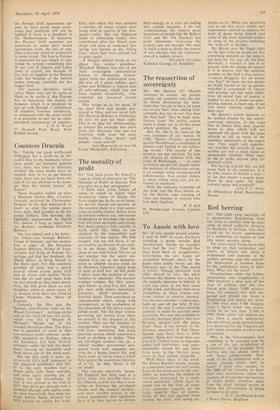The reassertion of sovereignty
Sir : Mr Hendry (27 March) attempts to answer my protest against our coercion into the EEC by thrice developing my state- ment that 'we are to have no more say in our fate', even adding 'con- siderably less say in our fate than the Ibos had'. This he finds satis- factory since 'the public cannot claim a direct say in all the issues which confront the nation.'
But, Sir, this is the issue of the very existence of our nation. In 1780, Henry Grattan protested against Westminster's usurpation of powers over Ireland in the follow- ing words: 'The people of this country are not satisfied. To stop the throats of millions with the Notes of Parliament, . . . to utter invectives against the people under the pretence of affectionate advice. is an attempt weak, suspicious and inflammatory. You cannot dictate to those whose sense you are en- trusted to represent.'
With the unhappy examples of the Irish and the Ibos before us, let the British take warning of what can happen to nations who lose their freedom.
W . E. Bell 86 Woodgrange Avenue, London N12










































 Previous page
Previous page